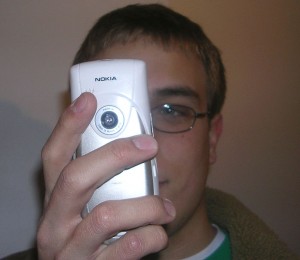 The same week we started school this year the word “selfie” was added to the Oxford Online Dictionary. Yes, a digital self-portrait. By the end of that week, Pope Francis took a few “selfies” in the Vatican with some Italian teenagers. That event caused a major international stir, given that most popes throughout history have remained somewhat distant and surrounded by an air of formality. But earlier in the spring this pope also opened a Twitter account – and he now tweets daily about everyday things – and offers his millions of followers spiritual direction and advice. So on the heels of generations of conservative practices, even the Pope is fostering an image as cool, contemporary and more in keeping with our times – largely through developing a broad social media platform.
The same week we started school this year the word “selfie” was added to the Oxford Online Dictionary. Yes, a digital self-portrait. By the end of that week, Pope Francis took a few “selfies” in the Vatican with some Italian teenagers. That event caused a major international stir, given that most popes throughout history have remained somewhat distant and surrounded by an air of formality. But earlier in the spring this pope also opened a Twitter account – and he now tweets daily about everyday things – and offers his millions of followers spiritual direction and advice. So on the heels of generations of conservative practices, even the Pope is fostering an image as cool, contemporary and more in keeping with our times – largely through developing a broad social media platform.
If I were to guess, I’d say that at least 90% of LCC high school students have also taken a few “selfies” and sent them out over the web – and most of them also have some form of social media presence. This is a topic that requires more thought than most teens have already given it. It’s important to remember that despite our technical capacity to do so, we can’t simply do anything anywhere and not expect to face consequences – sometimes unexpected.
On that front, I read recently about some teens who this summer visited an important Holocaust memorial at which a small group of them took silly “selfies” and fired them off to their friends and posted them to their Facebook accounts. Before they knew it, all sorts of people they didn’t know accused them of insensitivity. The Holocaust memorial is a place of remembrance, reverence and respect where many feel that silly photos simply don’t have a place. Whether or not a “selfie” is appropriate at memorials or other cultural monuments, it is fair to ask if the kids in question even reflected on where they were and what the monument symbolized. Did they consider the Holocaust and those who suffered? Or when kids arrive at any important monument or site these days, is it simply reflex to take a group “selfie” and move on without reflection? Most kids live in the moment and unfortunately often think after they act.
Another example of social media in the news last week was the case of three Toronto firefighters. They were fired for making allegedly sexist statements on their private Twitter accounts. The comments had nothing to do with their work or relationships with colleagues. Yet, the city of Toronto deemed the comments distasteful and out of step with the city’s core value of gender equity. It was reason enough to dismiss the firefighters. You may agree with that decision or you might fall into the camp that states that personal digital space is indeed entirely personal and should have no bearing on one’s profession. There is certainly ample room for debate here.
I believe we will be having lots of digital debates well into the future. Regardless of one’s position on the right to tweet and its intersection with free speech or the “selfie” phenomenon that is now employed even by the Pope, one thing is clear: lines regarding digital communications are blurred and we are living in a time of significant transition. We all possess tools with the capacity to create a broad public profile. Young people’s digital profiles matter – and whether they like it or not, people will judge them by it and perhaps well into the future.
A recent study by digital security experts McAfee indicates that about 50% of Canadians aged 18-34 are quite concerned about colleagues or bosses seeing their personal online materials and 16% know someone who has been fired after embarrassing content was found online.
There are no simple answers about how to act online, but I advise our students to slow down a little and think more before taking a “selfie,” posting an image or comment, or pressing send. Students should avoid falling victim to impulse, the egging on of their peers, or the temptation to do something they think might make them appear cool or confident. There’s nothing wrong with having fun or fooling around a little bit. But how will others interpret our kids’ digital statements? They should try to let an ethos of respect be their guiding light. This includes a simple litmus test: could grandma read it or would she be offended?
Teens shouldn’t cower or stop being involved with social media. They just need to slow down, think and evaluate first. Teens need to protect their personal digital profiles and their reputations. It matters – today and well into the future. – Christopher Shannon, Headmaster
PS: Last year, several LCC students participated with a McGill University research team investigating issues and trends in digital citizenship. The group called “Define the Line” will be holding a student digital summit in late November and we will participate. I look forward to the feedback.
